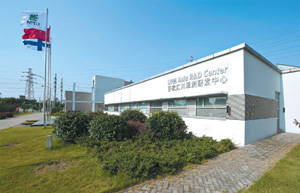Swarovski has crystal-clear vision for Chinese market
By Cecily Liu (China Daily) Updated: 2014-08-18 09:38
 |
|
Nadja Swarovski (center) says Swarovski's special efforts to design jewelry pieces targeting Chinese consumers have helped with sales. [Provided to China Daily] |
Austrian fashion house already has 245 stores in 71 cities across the country
Austrian crystal brand Swarovski's success in China is symbolic of a trend of female liberation in the country, observes Nadja Swarovski, fifth-generation heir to the business.
She recalls her first visit to China in 1992, when the city was full of bicycles and men and women in gray suits, an image in sharp contrast with how the city is today.
"The last time I visited, there were no bikes and no gray suits. I see it as a human revolution, and in particular a female revolution. The Chinese lady is allowed to wear a pink shirt and wear jewelry, and I think this is where Swarovski steps in," Swarovski says.
The confidence and luxury lifestyle Swarovski helped to bring to the modern Chinese women is just like the change it impacted on Western women centuries ago when her great-great-grandfather Daniel Swarovski founded the business in Austria in 1895.
At the time, diamonds were popular with aristocrats, but Daniel Swarovski famously said that every woman who cannot afford a diamond should have a crystal. It is a part of a revolution in mindset in which middle class women can enjoy fashion, and this trend is happening in China today.
"Swarovski's mission is to empower the customer, to make women feel good about themselves and express themselves. We know from studies that jewelry is the strongest means of expression. So if we can help women do this, we will be on the right track," she says.
Swarovski's first store in Hong Kong opened in 1972, and its first in the Chinese mainland in 1989.
Now, Swarovski is expanding in China at a rate of 25-30 stores a year. It already has stores in most tier-one and tier-two cities, and plans further growth. It has 245 stores in China covering 71 cities. For the past two years, revenue from the China market has accounted for 10 percent of the company's total revenue.
"The Chinese market appreciates Swarovski crystal because we're a European brand, with European craftsmanship," Swarovski says.
She adds that the company's special efforts to design jewelry pieces targeting Chinese consumers have also helped with sales. The 12 animals of the Chinese zodiac are a commonly used theme, and Swarovski has noticed an increase in sales of particular animals during the year devoted to them in the Chinese calendar.
Many Swarovski pieces targeting Chinese consumers are designed by young Chinese designers, including Masha Ma, Wang Peiyi and Ye Mingze.
Ye, for example, has designed the famous collection Flower and Seed of Love for Atelier Swarovski, which is a high-end product range for the brand. The design is built around the pattern of a six-petal symmetrical flower consisting of many smaller triangular patterns, which amazes viewers with its attention to detail.
Swarovski says her team met many of these Chinese designers through friends and partners in China, and she is amazed by their creativity and skills. Many of them have at some stage received education in the West, which made them appreciate Chinese traditions more upon returning, she says.
One example is Swarovski's participation in the 2013 Beijing Design Week, where Chinese and international designers were invited to create innovative designs with Swarovski crystal, using the theme of exploring memory in the digital age.
- Profitability of major textile companies improves in H1
- Swarovski has crystal-clear vision for Chinese market
- 220b yuan earmarked for affordable housing in H1
- China's new energy car output surges
- Hangzhou-Changsha railway expected to put into use at the end of August
- Anti-trust team lacks real muscle for enforcement
- China Vanke H1 profit growth slows
- China may cut oil price on crude retreat
















